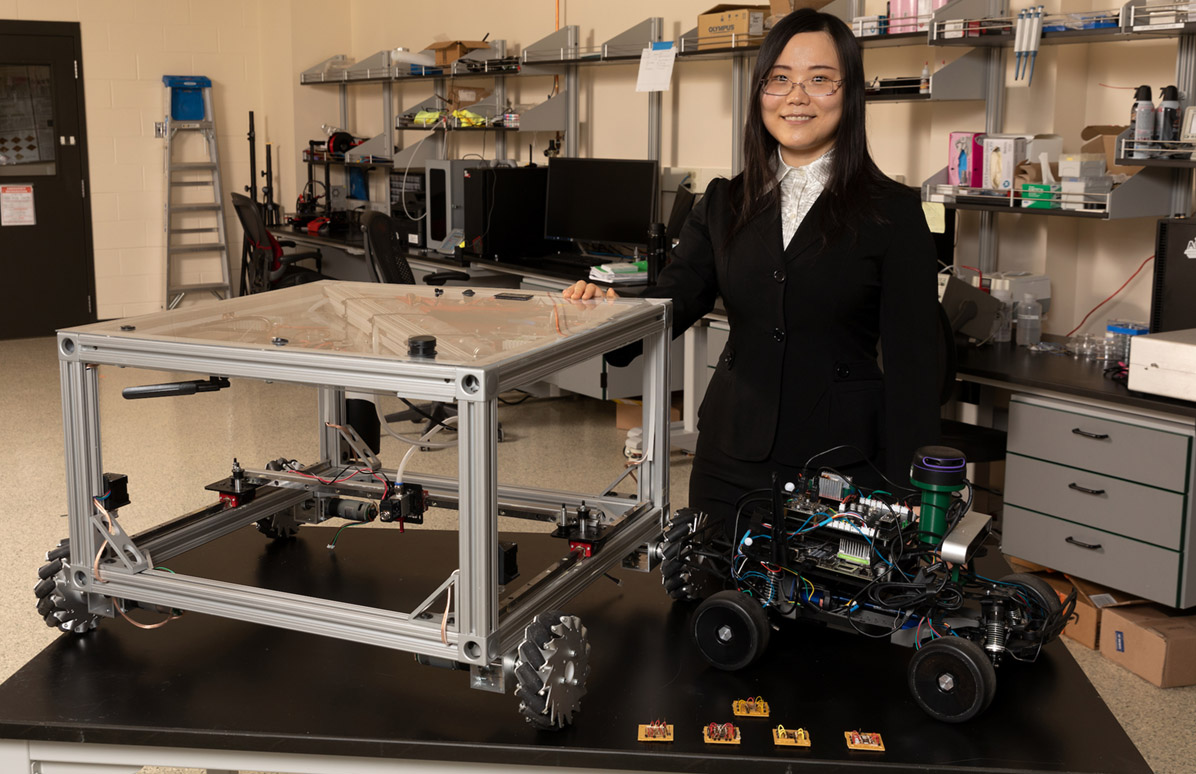Assistant professor’s nanobot research wins NSF CAREER Award
Watson College's Kaiyan Yu to use electric fields to control the separate movements of multiple nanoparticles

Many science fiction films and TV shows use tiny robots — smaller than the eye can see — as a cool and often convenient plot device.
Your spaceship has a hole in the hull? Nanobots will rebuild it. Medical emergency? Send in the nanobots to treat the injuries. Need to spy on the villains? Nanobots can get the heroes into restricted places and report back.
In the real world, research into nanotechnology has grown exponentially in recent years, with potential applications in medicine, electronics and materials science. Because of the size involved — one nanometer is a billionth of a meter, smaller than a strand of human DNA — current techniques cannot independently manipulate large numbers of nanoscale objects precisely and reliably.
Assistant Professor Kaiyan Yu, a faculty member in the Department of Mechanical Engineering at Binghamton University’s Thomas J. Watson College of Engineering and Applied Science, recently received a five-year, $588,608 National Science Foundation CAREER Award to study ways to overcome these limitations. A CAREER grant supports early-career faculty who have the potential to serve as academic role models in research and education.
“I’m trying to efficiently manipulate many micro- and nanoparticles with controlled three-dimensional poses and characteristics into functional devices, interconnects and other useful components for a variety of applications, such as building nanorobots that can deliver drugs directly to cells,” said Yu, who joined the Binghamton faculty in 2018. “Right now, because of manufacturing limits, it’s really hard to build this kind of nanorobot with a lot of sensors, strong actuators and on-board batteries, and also have them communicate with each other.”
Yu’s NSF research will investigate the use of electric fields to control the separate movements of multiple nanoparticles in a three-dimensional microfluidic environment. Each tiny wire could then go a different way to perform its own task.
“I’m trying to enable the efficient, automated, simultaneous and independent manipulation of a large number of small-scale agents using external fields,” Yu said. “How can we independently and autonomously control the motion of different kinds of particles, or even the same kinds of particles but for different functions? How many particles can we control at the same time using global external fields? We aim to answer these questions in the project.”
In the short term, Yu hopes her work will support engineering tools for large-volume automated control of microscopic objects for future smart small-scale factories that could produce large numbers of useful nanorobots and functional nanodevices. She also wants to contribute to efficient and inexpensive neuromorphic nanowire networks. Ultimately, she also has a much bigger goal in mind.
“We can build a nanowire-based neural network that can mimic the behaviors exhibited by biological neurons. We can facilitate the computational power and mimic the energy-efficient structure of the calculations in our brain,” she said. “I won’t build a human brain for this project, but hopefully I can do that in the future.”
In addition to supplying the necessary supplies, the NSF grant will fund the work of a graduate student to assist in the research as well as STEM-focused outreach programs in local schools. Yu especially wants to inspire more women and members of underrepresented communities to enter engineering and other science-related fields.
Having guaranteed funding to pursue this research — just one of her many projects involving large and small-scale robots — is an exciting prospect.
“This is my first try at a CAREER Award,” she said. “I feel blessed to be working in the Mechanical Engineering Department. I really appreciate all the help and support from my colleagues, the ME department, Watson College and the University in the past few years.”

